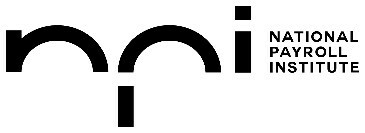New research indicates that immediate action is required to protect working Canadians from
growing and intensifying financial stress storm.
TORONTO, Oct. 3, 2023 /CNW/ – The financial stress storm, which began in 2021, is far more intense than predicted, and as it continues to grow, working Canadians need to take urgent action to protect themselves.
In fact, according to an analysis of the National Payroll Institute’s Annual Survey of Working Canadians conducted by Canada’s Financial Wellness Lab (the Lab), the number of working Canadians classified as being within the financially stressed cluster has jumped by 20 per cent in the past year alone to reach 37 per cent overall. This continues a trend that began in 2021 after an initial decline in 2020 when pandemic-induced lockdowns forced Canadians to save — which, with the benefit of hindsight, turns out to have actually been the calm before the storm.
“The frightening reality of this storm is that the contributing factors to financial stress are becoming more challenging than ever for Canadians to overcome,” explains Peter Tzanetakis, President of the National Payroll Institute. “The cluster analysis done by the Lab using our survey results dating back to 2014 has consistently found that reducing debt, saving more and spending less are the primary factors determining if individuals are financially comfortable, coping or stressed. With interest rates, inflation and the cost of living all continuing to rise, for many working Canadians navigating these factors have negatively impacted their financial wellness, and they need to take immediate and urgent action to keep from being overcome.”
Unfortunately, for financially stressed Canadians, saving money is more difficult than at any point in the past 10 years. To keep their heads above the rising waters, 63 per cent spend all of their net pay, and 30 per cent spend more than their net pay, resulting in the need to take on debt or dip into savings each pay cycle.
As a consequence, 66 per cent of the financially stressed cluster is living paycheque to paycheque, and 50 per cent are overwhelmed by their debt. By contrast, only two per cent of those who are financially comfortable and nine per cent of the financially coping cluster are living paycheque to paycheque.
In years past, accumulated savings and historically low costs of borrowing money offered shelter from the storm for many working Canadians. Today, financial stress’ damaging effects are evident and serious both at home and at work.
On a personal level, an alarming 55 per cent of Canadians in the stressed cluster admit that they feel more isolated due to the rising costs of living. They are also unable to keep their growing stress from affecting those closest to them, with one in two sharing that their financial stress has been felt by the ones they love.
“These results underscore how serious the storm is,” Tzanetakis adds. “Hoping that it will somehow pass or ignoring how it is affecting you – or, for employers, your business’ bottom line – is not a solution and could even make the situation worse. On the contrary, immediate action is needed, including making some difficult choices with regard to financial habits, to weather what is still ahead.”
At work, the situation is similar, as worry among workers regarding their finances is eroding productivity as well as employee engagement. A full 40 per cent of those surveyed in the stressed cluster said that they have been unable to keep financial stress from negatively affecting their performance on the job. On a daily basis, the average Canadian worker spends 33 minutes thinking about their finances while at work – equating to $45 billion dollars in lost productivity to Canadian employers.
Just as concerning to employers across Canada is the finding that one in five of those surveyed have needed to use a sick day to cope with their rising levels of financial stress, and one in every ten have left their job altogether.
Although it may seem obvious that earning more money, whether by changing jobs, a salary increase, or taking on a second job, is the best way to improve an individual’s state of financial wellness, the Lab’s analysis has consistently shown that this is not necessarily the case.
“Earning more money may help some, but our analysis has consistently shown that how much one earns is not generally a determining factor with regard to the financial wellness of working Canadians,” explains Chuck Grace, Managing Director of Canada’s Financial Wellness Lab and professor at the Ivey Business School at Western University. “It’s surprising, 35 per cent of the growing stressed cluster actually earn more than $100,000 per year.”
In actual fact, one of the best ways for Canadians to positively affect their financial wellness is by reducing reliance on debt and consolidating the sources of debt to more efficiently pay off what is already owed. “The costs of servicing debt in an economic environment marked by high-interest rates makes saving money for the rainy days still ahead much more difficult,” Grace adds. “Using more and more debt compounds the problem.”
Underscoring the importance of reducing the use of debt and the potential impact of consolidating what one owes is the correlation found by the Lab between the number of sources of debt and financial wellness. Those in the stressed cluster have, on average, four times more sources of debt than those in the comfortable cluster.
In addition to reducing debt – and perhaps a needed step for doing so – working Canadians looking to improve their financial wellness also need to make some difficult choices with regard to spending and what they deem to be ‘essential.’ This may mean foregoing a family vacation, delaying a purchase or choosing less expensive alternatives to ensure that there is enough left over after each paycheque to pay for food, clothing and shelter. Because these choices often affect not just the individual but their entire family, they are extremely difficult. They are also completely necessary, in light of the current emergency situation.
Finding a path out of financial struggles can seem daunting. Seeking qualified financial advice is a great first step for anyone looking to make positive changes to their situation.
Recognizing the impacts of financial stress on their bottom line and the serious situation many of their workers are facing, it’s incumbent on employers from coast to coast to provide support.
To this end, employers have a number of tools at their disposal, including the use of the National Payroll Institute’s Financial Fitness Evaluator for Business. A powerful tool, the evaluator is built on algorithms derived from the Lab’s analysis to enable employers to gauge the aggregate state of financial stress among their workforce and then implement appropriate solutions.
Among the solutions that might be considered are the following:
- Encouraging employees to automatically direct a portion of their pay into a savings accounts, which can be easily set up by payroll; and
- Investing in payroll professionalism to prevent unintentional payroll delays, which 65 per cent of the stressed cluster would have difficulty managing.
These steps from employers in combination with improved personal financial habits, will blunt the impact of the storm now and shorten its duration tomorrow. But it won’t be easy. Tougher times seem to be ahead.
The 15th Annual National Payroll Institute Survey of Working Canadians: An online survey of 1,500 working Canadians (81 percent of whom are full-time employees) was completed between July 21, 2023, and August 1, 2023, using Framework Analytics’ online panel. The panel is continually tested to ensure validity by comparing survey results to what has been measured in censuses, household studies conducted by statistical agencies and other reliable data sources. The survey is consistent with a margin of error of plus or minus 2.5% 19 times out of 20, but as a non-probabilistic methodology was used, a definitive margin of error cannot be expressed. The data was weighted to be representative.
The National Payroll Institute champions payroll in Canada as being vital to the health of businesses across Canada by setting THE professional standard of excellence and sharing critical expertise. We provide the knowledge and resources that more than 40,000 payroll professionals need to realize their potential, 1.5 million employers depend on for the annual payment of $1.06 trillion in wages and taxable benefits, and that governments rely on to receive $364 billion in statutory remittances to fund critical programs each year. The Institute’s designations are recognized as the gold standard for expertise and professionalism, and the only such designations for payroll in Canada.
SOURCE National Payroll Institute

Featured image: DepositPhoto © Belchonock








